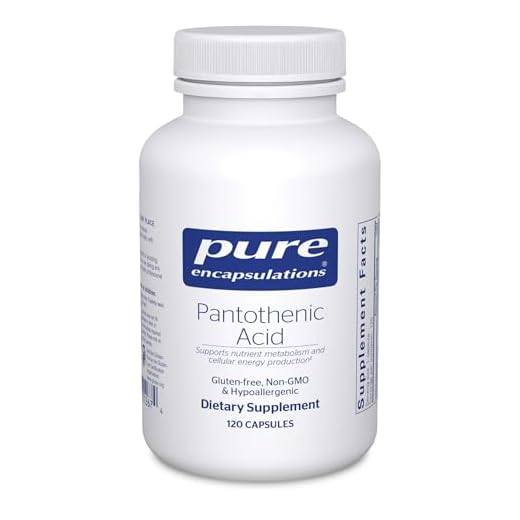







Yes, Vitamin B5, or pantothenic acid, can support your adrenal health. It's essential for synthesizing hormones like cortisol and epinephrine that help your body manage stress. Adequate levels of B5 promote improved energy production and can enhance adrenal sensitivity to ACTH stimulation, making hormone production more effective. Studies suggest that regular supplementation might also help with adrenal fatigue and overall well-being. To benefit from B5, include rich dietary sources like organ meats, legumes, and whole grains in your diet. If you're curious about optimizing your adrenal support, there's much more to explore on how B5 can fit into your routine.
Key Takeaways
- Vitamin B5 is essential for synthesizing coenzyme A, crucial for producing stress hormones like cortisol and epinephrine.
- It enhances adrenal sensitivity to ACTH, improving hormone secretion and overall adrenal function.
- Regular supplementation may alleviate symptoms of Adrenal Fatigue Syndrome by supporting adrenal health and resilience to stress.
- Studies show that pantothenic acid can improve adrenal steroid secretion, benefiting hormone regulation.
- Adequate intake of Vitamin B5 contributes to better energy levels, mental clarity, and emotional stability during stress.
Overview of Vitamin B5
Vitamin B5, or pantothenic acid, is an essential nutrient that plays a significant role in your body's metabolism and overall health. It's imperative for synthesizing coenzyme A, which is involved in fatty acid metabolism and the production of adrenal hormones. These hormones, like cortisol, are essential for managing stress and maintaining energy levels, linking vitamin B5 directly to adrenal health. Additionally, studies have shown that adequate pantothenic acid levels can enhance stamina and reduce fatigue, further supporting your body's response to stress supporting energy production.
While dietary deficiency of vitamin B5 is rare due to its presence in various foods—such as fresh meats, whole grains, and vegetables—it can occur in cases of severe malnutrition. The recommended daily intake for adults is about 5 mg, with increased needs for pregnant (6 mg) and breastfeeding women (7 mg).
If you're concerned about your intake, dietary supplements containing pantothenic acid are available and can enhance adrenal function. Research indicates that supplementation may improve adrenal sensitivity to ACTH, boosting hormone secretion. By ensuring you get sufficient vitamin B5, either through diet or supplements, you can support your adrenal glands and overall health effectively.
Health Benefits of Pantothenic Acid
Pantothenic acid offers a range of health benefits that extend beyond its role in adrenal health. As an essential component of vitamin B5, pantothenic acid is necessary for synthesizing coenzyme A, which plays an important role in fatty acid metabolism and the production of adrenal hormones like cortisol and epinephrine. By enhancing the production of these hormones, it helps your body effectively respond to stress. Additionally, regular supplementation of pantothenic acid may improve blood lipid profiles, supporting cardiovascular health and overall well-being, as seen in enhanced cardiovascular health with regular use.
Adequate intake of pantothenic acid can greatly improve your energy levels and mental clarity, particularly when facing stressful situations. Research suggests that supplementation may promote adrenal hyperresponsiveness, leading to increased secretion of key adrenal steroids such as corticosterone and progesterone. This can bolster your overall resilience against stress and fatigue.
On the other hand, a deficiency in pantothenic acid can lead to symptoms like fatigue, irritability, and even adrenal insufficiency, underscoring its significance in maintaining adrenal function. By ensuring you get enough vitamin B5, you not only support your adrenal health but also enhance your body's ability to cope with daily stressors and maintain peak energy levels.
Dietary Sources of Vitamin B5
When you're looking to boost your intake of vitamin B5, you'll find it's widely available in a variety of foods. This water-soluble vitamin, also known as pantothenic acid, is vital for supporting adrenal health and overall well-being. You'll discover that some of the best dietary sources include organ meats like liver and kidney, which are particularly rich in pantothenic acid.
In addition to organ meats, turkey, chicken, and milk also provide significant amounts. If you prefer plant-based options, you'll be pleased to know that vegetables such as kale, broccoli, and cauliflower, along with legumes, lentils, and avocados, are excellent sources. Whole grains are another great choice, contributing to your daily vitamin B5 intake.
Don't forget about other plant-based options like mushrooms, nutritional yeast, and fortified cereals, which cater to vegetarians and vegans. Since vitamin B5 isn't stored in large amounts in the body, consistent intake from these diverse dietary sources is essential to maintain adequate levels and support your adrenal health. Make sure to incorporate a variety of these foods into your diet for optimum benefits.
Recommended Intake and Supplements
Maintaining ideal levels of pantothenic acid is essential for your health, particularly for adrenal function and hormone production. This vitamin plays a significant role in energy metabolism and cognitive function, making it important for overall wellbeing. The recommended daily intake for adults is around 5 mg, while pregnant and breastfeeding women may need slightly higher amounts—6 mg and 7 mg, respectively. For children and teenagers, the intake ranges from 1.7 mg for infants to 5 mg for those aged 14-18 years. Energy metabolism support is critical as it aids in converting food into usable energy, which is especially beneficial for active individuals.
Pantothenic acid is available as supplements in various forms, including capsules, tablets, and softgels. You can choose to take it individually or as part of a B complex formulation. Although there's no established Recommended Dietary Allowance (RDA) for vitamin B5, guaranteeing you meet the recommended intake is essential for supporting adrenal health.
In some cases, healthcare providers may prescribe higher doses of pantothenic acid for specific health conditions, especially those related to adrenal function. However, it's important to monitor supplementation closely to avoid potential side effects. If you're considering taking supplements, consult your healthcare provider to determine the right dosage for your needs and make sure you're prioritizing your health effectively.
Precautions and Side Effects
Before you consider supplementing with vitamin B5, it's important to be aware of potential precautions and side effects. While pantothenic acid plays a significant role in adrenal health, high doses can lead to issues like diarrhea and an increased risk of bleeding. As a result, it's crucial to approach supplementation cautiously. Always consult with your healthcare provider before starting any new supplement, especially if you're taking medications like tetracycline antibiotics or blood thinners, as interactions may occur.
If you're pregnant or breastfeeding, stick to the recommended intake levels of vitamin B5—6 mg for pregnant women and 7 mg for those nursing—unless directed by a healthcare professional. Additionally, if you have Adrenal Fatigue Syndrome (AFS), be aware that you might experience heightened sensitivity to supplements, potentially leading to paradoxical reactions such as increased anxiety.
Long-term use of individual B vitamins, including B5, can cause nutritional imbalances. To mitigate this risk, consider using a B complex formulation, which provides a balanced intake of important vitamins. Always prioritize safety and guidance when it comes to your health.
Research on Adrenal Health
While research continues to explore the effects of pantothenic acid on adrenal health, findings suggest that this vitamin plays an essential role in supporting adrenal function. Studies indicate that pantothenic acid enhances adrenal steroid secretion, resulting in increased corticosterone and progesterone levels in treated male rats. This points to its supportive role in hormone production.
One significant study published in the Biological & Pharmaceutical Bulletin demonstrated that pantothenic acid supplementation increases adrenal sensitivity to ACTH, a fundamental factor for effective hormone production. Additionally, pantothenic acid is necessary for synthesizing coenzyme A (CoA), which is crucial for metabolizing fatty acids and producing stress hormones like cortisol.
Long-term supplementation may lead to adrenal hyperresponsiveness, allowing your adrenal glands to react more effectively to stress-related signals. This is particularly beneficial for individuals experiencing adrenal fatigue, as pantothenic acid supports overall adrenal function and may help regulate cortisol levels. By incorporating pantothenic acid into your regimen, you could enhance your adrenal health and improve your body's response to stress.
Summary of Key Findings
Research on the role of pantothenic acid in adrenal health highlights several key findings that underscore its significance. Pantothenic acid, also known as vitamin B5, is essential for synthesizing coenzyme A, which is critical for producing stress hormones like cortisol and epinephrine. This process directly supports overall adrenal health. Studies suggest that pantothenic acid supplementation can enhance adrenal sensitivity to ACTH stimulation, resulting in increased secretion of corticosterone and progesterone in treated subjects.
Adequate intake of vitamin B5 may improve adrenal function and the body's response to stress, potentially aiding in managing conditions such as Adrenal Fatigue Syndrome. The recommended daily intake for adults is about 5 mg, but higher doses might be necessary for those with specific health issues impacting adrenal health.
Fortunately, pantothenic acid is readily available in various foods and supplements, making it accessible for you to maintain peak adrenal function and overall well-being. By ensuring you meet the recommended intake, you can support your adrenal health and potentially enhance your resilience to stress.
Conclusion
In summary, while vitamin B5 plays an essential role in overall health, its specific impact on adrenal health is still being explored. As the saying goes, "An ounce of prevention is worth a pound of cure." Ensuring you get enough pantothenic acid through a balanced diet can support your body's functions. However, it's always wise to consult with a healthcare professional before making any significant changes to your supplement routine. Stay informed and prioritize your well-being!






